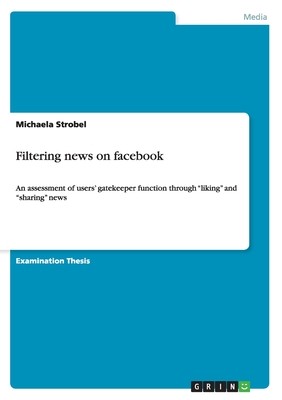
- We will send in 10–14 business days.
- Author: Michaela Strobel
- Publisher: GRIN Verlag
- Year: 2013
- Pages: 20
- ISBN-10: 3656563217
- ISBN-13: 9783656563211
- Format: 14.8 x 21 x 0.1 cm, softcover
- Language: English
- SAVE -10% with code: EXTRA
Reviews
Description
Examination Thesis from the year 2013 in the subject Communications - Public Relations, Advertising, Marketing, Social Media, grade: 2,0, Stockholm University (JMK), course: Method Project, language: English, abstract: The basis for this study is the assumption that there is a shift in power relations to be observed due to the growing importance of networks online. Following the recent downward spiral of traditional news media's sales (MarketLine, February 2013) the question is whether those formerly well-respected news sources are not only losing revenue but also their authoritative position as opinion leaders. . News content may vary in different countries and social layers but the fact that news has always been a decisive factor in human interaction also applies - if not even more - to the online world. According to the recent McArthur report, 58 % of forwarded links in the U.S. are containing a political message - a phenomenon called "latent capacity" (Jenkins, 2012, p. 12). Newspapers have recognized this potential and created their own pages on social networks. But is this measure effective? Are people still more likely to "like" and "share" information which has been publicized by a supposedly reliable media house or do they trace the information back to its source by checking the concerning company's, organization's or celebrity's easily accessible facebook page? Moreover, are facebook "friends" taking over the function of gatekeepers who supply us with information? What is of interest in this respect is where those forwarded links are originating. As Christakis and Fowler unravel in their study on social networks, those trends do not only spill over from friend to friend, but even more by traversing several connections such as our "friends' friends' friends" (Christakis & Fowler, 2009, p. 22) - a phenomenon which Granovetter calls "the strength of weak ties" (Granovetter, 1973). In the time of facebook trends and opinions are taking shape within the re
EXTRA 10 % discount with code: EXTRA
The promotion ends in 15d.12:53:48
The discount code is valid when purchasing from 10 €. Discounts do not stack.
- Author: Michaela Strobel
- Publisher: GRIN Verlag
- Year: 2013
- Pages: 20
- ISBN-10: 3656563217
- ISBN-13: 9783656563211
- Format: 14.8 x 21 x 0.1 cm, softcover
- Language: English English
Examination Thesis from the year 2013 in the subject Communications - Public Relations, Advertising, Marketing, Social Media, grade: 2,0, Stockholm University (JMK), course: Method Project, language: English, abstract: The basis for this study is the assumption that there is a shift in power relations to be observed due to the growing importance of networks online. Following the recent downward spiral of traditional news media's sales (MarketLine, February 2013) the question is whether those formerly well-respected news sources are not only losing revenue but also their authoritative position as opinion leaders. . News content may vary in different countries and social layers but the fact that news has always been a decisive factor in human interaction also applies - if not even more - to the online world. According to the recent McArthur report, 58 % of forwarded links in the U.S. are containing a political message - a phenomenon called "latent capacity" (Jenkins, 2012, p. 12). Newspapers have recognized this potential and created their own pages on social networks. But is this measure effective? Are people still more likely to "like" and "share" information which has been publicized by a supposedly reliable media house or do they trace the information back to its source by checking the concerning company's, organization's or celebrity's easily accessible facebook page? Moreover, are facebook "friends" taking over the function of gatekeepers who supply us with information? What is of interest in this respect is where those forwarded links are originating. As Christakis and Fowler unravel in their study on social networks, those trends do not only spill over from friend to friend, but even more by traversing several connections such as our "friends' friends' friends" (Christakis & Fowler, 2009, p. 22) - a phenomenon which Granovetter calls "the strength of weak ties" (Granovetter, 1973). In the time of facebook trends and opinions are taking shape within the re


Reviews